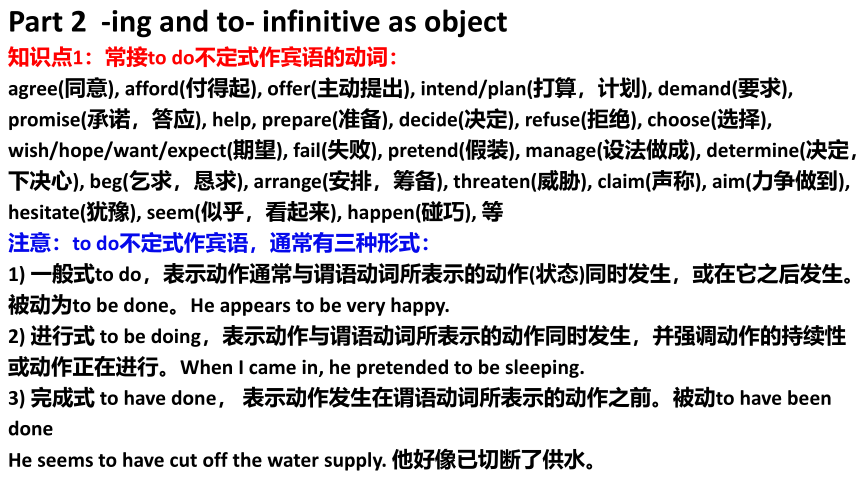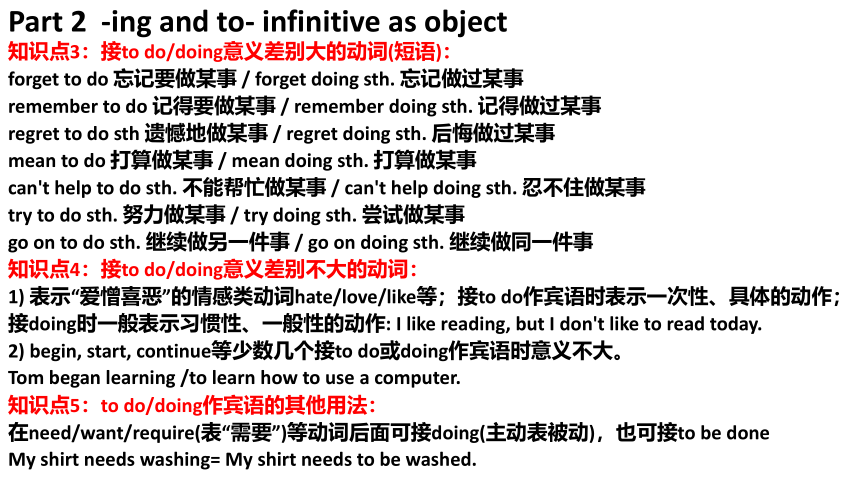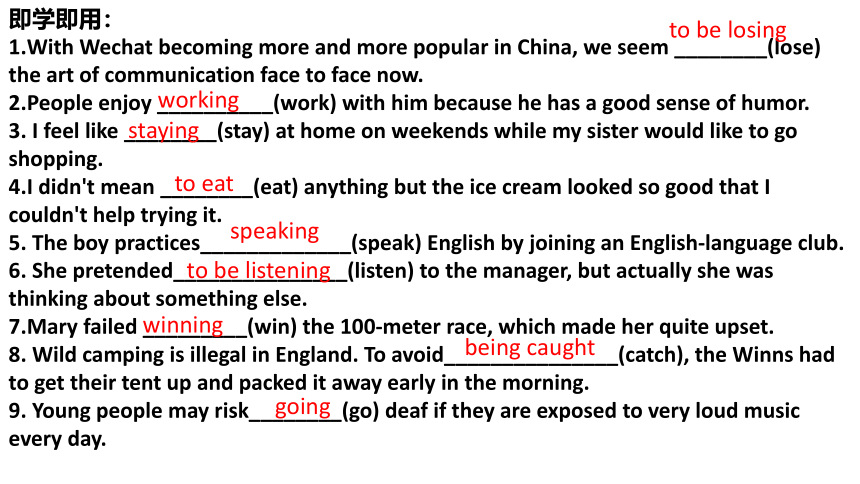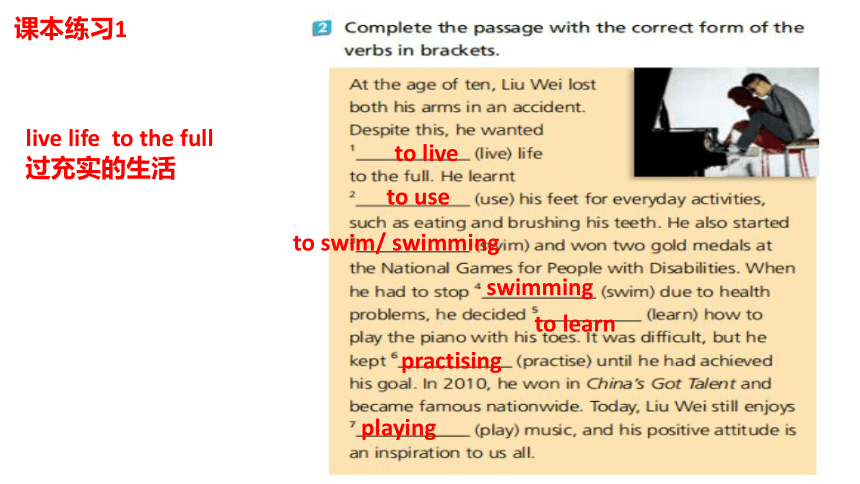外研版(2019)选择性必修 第一册Unit2 Onwards and upwards Using language 课件 (共17张PPT)
文档属性
| 名称 | 外研版(2019)选择性必修 第一册Unit2 Onwards and upwards Using language 课件 (共17张PPT) |  | |
| 格式 | zip | ||
| 文件大小 | 7.0MB | ||
| 资源类型 | 教案 | ||
| 版本资源 | 外研版(2019) | ||
| 科目 | 英语 | ||
| 更新时间 | 2022-08-27 11:49:55 | ||
图片预览







文档简介
(共17张PPT)
Unit 2 Onwards and upwards
第二课时 Using language
Part 1 fill in the blanks .
We regret to inform (inform) you……
These are the words that every writer dreads receiving (receive), but words every writer knows well.
After a total of twelve rejections , one publisher eventually agreed to print (print) 500 copies of her first book.
J.D.Salinger started writing/ to write (write)short stories in high school, but later stuggled to get (get)his works published.
Despite rejections from several publishers, J.D.Salinger refused to give(give) up.
When it was eventually published , the book became an immediate best-seller and went on to sell (sell) milliions and millions of copies.
Perhaps the overall prize for perseverance should go to three sisters from Victorian England who dreamt of seeing (see) their words in print .
Keep trying (try) and eventually you will read the words “We are delighted to inform you ……”
to inform
receiving
to print
writing/ to write
to get
to give
to sell
seeing
trying
Part 2 -ing and to- infinitive as object
知识点1:常接to do不定式作宾语的动词:
agree(同意), afford(付得起), offer(主动提出), intend/plan(打算,计划), demand(要求), promise(承诺,答应), help, prepare(准备), decide(决定), refuse(拒绝), choose(选择), wish/hope/want/expect(期望), fail(失败), pretend(假装), manage(设法做成), determine(决定,下决心), beg(乞求,恳求), arrange(安排,筹备), threaten(威胁), claim(声称), aim(力争做到), hesitate(犹豫), seem(似乎,看起来), happen(碰巧), 等
注意:to do不定式作宾语,通常有三种形式:
1) 一般式to do,表示动作通常与谓语动词所表示的动作(状态)同时发生,或在它之后发生。被动为to be done。He appears to be very happy.
2) 进行式 to be doing,表示动作与谓语动词所表示的动作同时发生,并强调动作的持续性或动作正在进行。When I came in, he pretended to be sleeping.
3) 完成式 to have done, 表示动作发生在谓语动词所表示的动作之前。被动to have been done
He seems to have cut off the water supply. 他好像已切断了供水。
Part 2 -ing and to- infinitive as object
知识点2:常接-ing作宾语的动词:
appreciate(感激), consider(考虑), delay(推迟), avoid(避免), finish(完成), imagine(想象), miss(错过), mean(意味着), resist(抵抗), risk(冒险), suggest(建议) , mind(介意), give up/quit(放弃), insist on(坚持), allow(允许), feel like(想要), escape(避免,逃避), admit(承认),等
注意:动词-ing的复合结构作宾语,有以下几种形式:
1) 形容词性物主代词 + doing:He left the city without our knowing it.
2) 人称代词宾格 + doing:Would you mind my/ me using your cell phone
3) 名词's + doing :I appreciate Tom's helping me when I was caught in trouble.
4) 名词 + doing:I knew nothing about the window being open.
Part 2 -ing and to- infinitive as object
知识点3:接to do/doing意义差别大的动词(短语):
forget to do 忘记要做某事 / forget doing sth. 忘记做过某事
remember to do 记得要做某事 / remember doing sth. 记得做过某事
regret to do sth 遗憾地做某事 / regret doing sth. 后悔做过某事
mean to do 打算做某事 / mean doing sth. 打算做某事
can't help to do sth. 不能帮忙做某事 / can't help doing sth. 忍不住做某事
try to do sth. 努力做某事 / try doing sth. 尝试做某事
go on to do sth. 继续做另一件事 / go on doing sth. 继续做同一件事
知识点4:接to do/doing意义差别不大的动词:
1) 表示“爱憎喜恶”的情感类动词hate/love/like等;接to do作宾语时表示一次性、具体的动作;接doing时一般表示习惯性、一般性的动作: I like reading, but I don't like to read today.
2) begin, start, continue等少数几个接to do或doing作宾语时意义不大。
Tom began learning /to learn how to use a computer.
知识点5:to do/doing作宾语的其他用法:
在need/want/require(表“需要”)等动词后面可接doing(主动表被动),也可接to be done
My shirt needs washing= My shirt needs to be washed.
即学即用:
1.With Wechat becoming more and more popular in China, we seem ________(lose) the art of communication face to face now.
2.People enjoy __________(work) with him because he has a good sense of humor.
3. I feel like ________(stay) at home on weekends while my sister would like to go shopping.
4.I didn't mean ________(eat) anything but the ice cream looked so good that I couldn't help trying it.
5. The boy practices_____________(speak) English by joining an English-language club.
6. She pretended_______________(listen) to the manager, but actually she was thinking about something else.
7.Mary failed _________(win) the 100-meter race, which made her quite upset.
8. Wild camping is illegal in England. To avoid_______________(catch), the Winns had to get their tent up and packed it away early in the morning.
9. Young people may risk________(go) deaf if they are exposed to very loud music every day.
to be losing
working
staying
to eat
speaking
to be listening
winning
being caught
going
to live
to use
to swim/ swimming
swimming
to learn
practising
playing
live life to the full
过充实的生活
课本练习1
Possible version
Jamie Wells decided to join the Boy Scouts because he enjoyed challenging himself as well as meeting new friends.He thought scout camp was fun,but not without its challenges! Each day began with a 5-kilometer cross-country run-at 6am! At first he failed to finish the whole route.On the fourth day,he was so tired that he even didn't want to get out of bed. Feeling homesick, he regretted attending the scout camp and wanted to phone his dad to take him home.But he didn't give up.Things soon got better.He became stronger and more confident and made new friends.He admitted being a scout had its challenges,butit was worthwhile.
课本练习2
Activity 5 match the expressions to their meanings and remember the meaning of them.
turn over a new leaf to change your life by starting to be a better person or stopping a bad habit
an eager beaver some one who is extremely enthusiastic and enjoys working extremely hard
not lift a finger to not make any effort
cool as a cucumber very calm and relaxed, especially in a difficult situation
drag one's feet to do something very slowly because you do not really want to do it
a wet blanket someone who refuses to join in, or wants to stop other people having fun
Part 3: Looking on the bright side
e.turn over a new leaf
c.an eager beaver
a.not lift a finger
f.cool as a cucumber
d.drag one's feet
b.a wet blanket
重新开始,改过自新
一个做事勤劳的人
连手指都不动一动的,袖手旁观
十分冷静
迟迟不行动,拖拉,磨磨蹭蹭不情愿
令人扫兴的人
Activity 6 Put expressions in Activity 5 into the boxes. Add any more you can think of.
Positive
Negative
c,e,f
a,b,d
like a duck to water
如鱼得水,轻而易举地
a fish out of water
离水之鱼,不得其所的人,浑身不自在
What a surprise! Linda took to learning French like a duck to water.
真想不到,Linda学习法语就像鸭子学游水那么轻而易举
It's completely normal to feel like a fish out of water when you arrive at a new place, not knowing anyone. 当你初来乍到一个地方,不认识任何人的时候,你会感觉像一条离开水的鱼,这是很正常的。
Activity 7 Read the passage and find out
1. why it is important to “look on the bright side”
2. how our attitude can affect others
Because looking on the bright side is a type of good attitude, which can have a positive effect on other people. In this way, looking on the bright side is the best thing we can do for ourselves as well as for other.
Our attitude is likely to spread to and affect others. If we have a good attitude, others will feel it and be cheered up by it.
Part 3: Looking on the bright side
Phrases in the passage
be made up of = be composed of = consist of(无被动)
ups and downs 起伏,来来回回,兴衰,沉浮
feel low 情绪不高,意气消沉
lend sb an ear 倾听某人
contagious /k n te d s/ adj. 感染性的;会蔓延的
pass on (to sb.)传递;继续;去世pass away
Part 3 Activity 8 Listen to the conversation and number the pictures according to the sequence of events.
A - 4
B - 1
C - 3
D - 2
2
1
4
3
Activity 9 Listen again and complete the journal entry.
Friday 10 May
Today I came across my friend Dawei. He looked sad, so I asked him what was wrong. He said that he failed in a ___________________contest. Before the contest, he competed against a girl at school. He won, but he said it was because ________. He thought the girl should have gone to _________________ instead. If she had, the school would have been _______. I tried to make him look on the bright side, and he admitted that he had a good time at the national contest. He met some ___________ and he liked the city. He also said his parents felt ___________. I think I made him feel better.
should have done sth. 本该做某事(但未做)
should not have done sth. 本不该做某事(但做了)
national English speaking
he was lucky
the national competition
well-known
fantastic people
proud of him
Listening scripts:
Jack: Hi, Dawei. Are you OK
Dawei: Yeah...I'm all right. I suppose.
Jack: OK...I don't mean to be nosy, but are you sure You look down.
Dawei: I could be better, to be honest.
Jack: That's what I thought. Why don't you tell me what's up
Dawei: Well, I took part in a national English speaking competition in Beijing, and I finished in last place.
Jack: Oh, really I'm sorry to hear that. I'm sure you did your best, though.
Dawei: I did, but it wasn't good enough. The other kids were just better than me.
Jack: But you must have been very good to get into the competition. You should be proud of yourself.
Dawei: Well, there was a competition at school first that was held to see who would go into the national competition. I won that, but...
Jack: There you go! You have no reason to be sad. You're the best English speaker at school.
Dawei: That's the problem. I don't think I am. I think Liu Jing is better than me, and she should have gone to Beijing instead of me.
adj. 好管闲事的,爱打听的
Jack: Who's Liu Jing
Dawei: She's a girl in my class. When we did the school competition, we were the top two students. The final school competition was betwen me and her -the winner would go to Beijing.
Jack: OK, but you won, fair and square. Why are you so upset
Dawei: I think I was just lucky. Liu Jing's much better at English than I am. If she had gone to the national competition, she would have won. Our school would have become well known, and everyone would have been happy. Instead, I went to Beijing and lost.
Jack: Oh, Dawei, you can't think like that! Who knows what would have happened I know this is hard for you, but you should cheer up. I mean, did you have a good time in Beijing
Dawei: Yes, I suppose I did. It's a really exciting city, and I met some fantastic people..
Jack: There you go! You had a good time. And I'm sure your parents are proud of you!
Dawei: They are, yes. It was great experience, but I just wish I had won.
Jack:[laughs]You can't win everything, Dawei! You're the best in the school, and that means a lot. Perhaps one day, if you study hard, you can be the best in the country!
Dwei: Yes, I hadn't thought of that. There will be another competition in March. Perhaps I could try again then.
Jack: That's the spirit! I know an English saying:”If at first you don't succeed, try, try again.”
Dawei: Yes, that's good advice. Thanks, Jack. You've really cheered me up. I feel a lot better now.
Jack: No problem. And why don't you talk to Liu Jing You can practise together.
Dawei: Yes, I'll do that. Thank you so much!
光明正大;公正
主题写作---积极向上
假定你是李华,你的美国笔友Peter给你写信诉说了他的难过和迷茫,原因是他在他们学校近期刚结束的演讲比赛中失败了,请你写一封信帮他分析原因并鼓励他继续努力。
要点:1.分析原因 2.给予鼓励 3.其他方面; 100词左右,适当增加细节,使行文连贯。
翻译:1.高兴收到你的来信。我已得知你因在学校演讲比赛中失败一直觉得很烦恼。我想和你分享一下我的想法。
2. 作为学生,我从前也遇到过同样的问题。但我认为未来还有很多比赛要参加,我们不应该只是追求成功还应该享受竞争的乐趣。即使在比赛中失败,我们也不应失去信心。我们应该坚持直到成功。只有这样,我们才会发现这些比赛是值得的。如果你能放下坏心情那就太好了。
3.希望我的分享能对你有帮助。盼望收到你的来信。
Dear Peter,
I'm delighted to hear from you. Having known that you have been upset because of failing in the school speech contest, I would like to share my ideas with you.
As a student, I met the same problem before. But I hold the belief that with many contests to take, we should not only pursue success but also enjoy the relish of competition. Even though we may fail in the contests, we should not lose heart. Instead, we should persevere until we succeed. Only in this way can we find these contests worthwhile. I think it would be a blessing if you could leave bad mood behind.
I do hope that what I have shared can be helpful to you and I'm looing forward to your reply.
Yours,
Li Hua
Unit 2 Onwards and upwards
第二课时 Using language
Part 1 fill in the blanks .
We regret to inform (inform) you……
These are the words that every writer dreads receiving (receive), but words every writer knows well.
After a total of twelve rejections , one publisher eventually agreed to print (print) 500 copies of her first book.
J.D.Salinger started writing/ to write (write)short stories in high school, but later stuggled to get (get)his works published.
Despite rejections from several publishers, J.D.Salinger refused to give(give) up.
When it was eventually published , the book became an immediate best-seller and went on to sell (sell) milliions and millions of copies.
Perhaps the overall prize for perseverance should go to three sisters from Victorian England who dreamt of seeing (see) their words in print .
Keep trying (try) and eventually you will read the words “We are delighted to inform you ……”
to inform
receiving
to print
writing/ to write
to get
to give
to sell
seeing
trying
Part 2 -ing and to- infinitive as object
知识点1:常接to do不定式作宾语的动词:
agree(同意), afford(付得起), offer(主动提出), intend/plan(打算,计划), demand(要求), promise(承诺,答应), help, prepare(准备), decide(决定), refuse(拒绝), choose(选择), wish/hope/want/expect(期望), fail(失败), pretend(假装), manage(设法做成), determine(决定,下决心), beg(乞求,恳求), arrange(安排,筹备), threaten(威胁), claim(声称), aim(力争做到), hesitate(犹豫), seem(似乎,看起来), happen(碰巧), 等
注意:to do不定式作宾语,通常有三种形式:
1) 一般式to do,表示动作通常与谓语动词所表示的动作(状态)同时发生,或在它之后发生。被动为to be done。He appears to be very happy.
2) 进行式 to be doing,表示动作与谓语动词所表示的动作同时发生,并强调动作的持续性或动作正在进行。When I came in, he pretended to be sleeping.
3) 完成式 to have done, 表示动作发生在谓语动词所表示的动作之前。被动to have been done
He seems to have cut off the water supply. 他好像已切断了供水。
Part 2 -ing and to- infinitive as object
知识点2:常接-ing作宾语的动词:
appreciate(感激), consider(考虑), delay(推迟), avoid(避免), finish(完成), imagine(想象), miss(错过), mean(意味着), resist(抵抗), risk(冒险), suggest(建议) , mind(介意), give up/quit(放弃), insist on(坚持), allow(允许), feel like(想要), escape(避免,逃避), admit(承认),等
注意:动词-ing的复合结构作宾语,有以下几种形式:
1) 形容词性物主代词 + doing:He left the city without our knowing it.
2) 人称代词宾格 + doing:Would you mind my/ me using your cell phone
3) 名词's + doing :I appreciate Tom's helping me when I was caught in trouble.
4) 名词 + doing:I knew nothing about the window being open.
Part 2 -ing and to- infinitive as object
知识点3:接to do/doing意义差别大的动词(短语):
forget to do 忘记要做某事 / forget doing sth. 忘记做过某事
remember to do 记得要做某事 / remember doing sth. 记得做过某事
regret to do sth 遗憾地做某事 / regret doing sth. 后悔做过某事
mean to do 打算做某事 / mean doing sth. 打算做某事
can't help to do sth. 不能帮忙做某事 / can't help doing sth. 忍不住做某事
try to do sth. 努力做某事 / try doing sth. 尝试做某事
go on to do sth. 继续做另一件事 / go on doing sth. 继续做同一件事
知识点4:接to do/doing意义差别不大的动词:
1) 表示“爱憎喜恶”的情感类动词hate/love/like等;接to do作宾语时表示一次性、具体的动作;接doing时一般表示习惯性、一般性的动作: I like reading, but I don't like to read today.
2) begin, start, continue等少数几个接to do或doing作宾语时意义不大。
Tom began learning /to learn how to use a computer.
知识点5:to do/doing作宾语的其他用法:
在need/want/require(表“需要”)等动词后面可接doing(主动表被动),也可接to be done
My shirt needs washing= My shirt needs to be washed.
即学即用:
1.With Wechat becoming more and more popular in China, we seem ________(lose) the art of communication face to face now.
2.People enjoy __________(work) with him because he has a good sense of humor.
3. I feel like ________(stay) at home on weekends while my sister would like to go shopping.
4.I didn't mean ________(eat) anything but the ice cream looked so good that I couldn't help trying it.
5. The boy practices_____________(speak) English by joining an English-language club.
6. She pretended_______________(listen) to the manager, but actually she was thinking about something else.
7.Mary failed _________(win) the 100-meter race, which made her quite upset.
8. Wild camping is illegal in England. To avoid_______________(catch), the Winns had to get their tent up and packed it away early in the morning.
9. Young people may risk________(go) deaf if they are exposed to very loud music every day.
to be losing
working
staying
to eat
speaking
to be listening
winning
being caught
going
to live
to use
to swim/ swimming
swimming
to learn
practising
playing
live life to the full
过充实的生活
课本练习1
Possible version
Jamie Wells decided to join the Boy Scouts because he enjoyed challenging himself as well as meeting new friends.He thought scout camp was fun,but not without its challenges! Each day began with a 5-kilometer cross-country run-at 6am! At first he failed to finish the whole route.On the fourth day,he was so tired that he even didn't want to get out of bed. Feeling homesick, he regretted attending the scout camp and wanted to phone his dad to take him home.But he didn't give up.Things soon got better.He became stronger and more confident and made new friends.He admitted being a scout had its challenges,butit was worthwhile.
课本练习2
Activity 5 match the expressions to their meanings and remember the meaning of them.
turn over a new leaf to change your life by starting to be a better person or stopping a bad habit
an eager beaver some one who is extremely enthusiastic and enjoys working extremely hard
not lift a finger to not make any effort
cool as a cucumber very calm and relaxed, especially in a difficult situation
drag one's feet to do something very slowly because you do not really want to do it
a wet blanket someone who refuses to join in, or wants to stop other people having fun
Part 3: Looking on the bright side
e.turn over a new leaf
c.an eager beaver
a.not lift a finger
f.cool as a cucumber
d.drag one's feet
b.a wet blanket
重新开始,改过自新
一个做事勤劳的人
连手指都不动一动的,袖手旁观
十分冷静
迟迟不行动,拖拉,磨磨蹭蹭不情愿
令人扫兴的人
Activity 6 Put expressions in Activity 5 into the boxes. Add any more you can think of.
Positive
Negative
c,e,f
a,b,d
like a duck to water
如鱼得水,轻而易举地
a fish out of water
离水之鱼,不得其所的人,浑身不自在
What a surprise! Linda took to learning French like a duck to water.
真想不到,Linda学习法语就像鸭子学游水那么轻而易举
It's completely normal to feel like a fish out of water when you arrive at a new place, not knowing anyone. 当你初来乍到一个地方,不认识任何人的时候,你会感觉像一条离开水的鱼,这是很正常的。
Activity 7 Read the passage and find out
1. why it is important to “look on the bright side”
2. how our attitude can affect others
Because looking on the bright side is a type of good attitude, which can have a positive effect on other people. In this way, looking on the bright side is the best thing we can do for ourselves as well as for other.
Our attitude is likely to spread to and affect others. If we have a good attitude, others will feel it and be cheered up by it.
Part 3: Looking on the bright side
Phrases in the passage
be made up of = be composed of = consist of(无被动)
ups and downs 起伏,来来回回,兴衰,沉浮
feel low 情绪不高,意气消沉
lend sb an ear 倾听某人
contagious /k n te d s/ adj. 感染性的;会蔓延的
pass on (to sb.)传递;继续;去世pass away
Part 3 Activity 8 Listen to the conversation and number the pictures according to the sequence of events.
A - 4
B - 1
C - 3
D - 2
2
1
4
3
Activity 9 Listen again and complete the journal entry.
Friday 10 May
Today I came across my friend Dawei. He looked sad, so I asked him what was wrong. He said that he failed in a ___________________contest. Before the contest, he competed against a girl at school. He won, but he said it was because ________. He thought the girl should have gone to _________________ instead. If she had, the school would have been _______. I tried to make him look on the bright side, and he admitted that he had a good time at the national contest. He met some ___________ and he liked the city. He also said his parents felt ___________. I think I made him feel better.
should have done sth. 本该做某事(但未做)
should not have done sth. 本不该做某事(但做了)
national English speaking
he was lucky
the national competition
well-known
fantastic people
proud of him
Listening scripts:
Jack: Hi, Dawei. Are you OK
Dawei: Yeah...I'm all right. I suppose.
Jack: OK...I don't mean to be nosy, but are you sure You look down.
Dawei: I could be better, to be honest.
Jack: That's what I thought. Why don't you tell me what's up
Dawei: Well, I took part in a national English speaking competition in Beijing, and I finished in last place.
Jack: Oh, really I'm sorry to hear that. I'm sure you did your best, though.
Dawei: I did, but it wasn't good enough. The other kids were just better than me.
Jack: But you must have been very good to get into the competition. You should be proud of yourself.
Dawei: Well, there was a competition at school first that was held to see who would go into the national competition. I won that, but...
Jack: There you go! You have no reason to be sad. You're the best English speaker at school.
Dawei: That's the problem. I don't think I am. I think Liu Jing is better than me, and she should have gone to Beijing instead of me.
adj. 好管闲事的,爱打听的
Jack: Who's Liu Jing
Dawei: She's a girl in my class. When we did the school competition, we were the top two students. The final school competition was betwen me and her -the winner would go to Beijing.
Jack: OK, but you won, fair and square. Why are you so upset
Dawei: I think I was just lucky. Liu Jing's much better at English than I am. If she had gone to the national competition, she would have won. Our school would have become well known, and everyone would have been happy. Instead, I went to Beijing and lost.
Jack: Oh, Dawei, you can't think like that! Who knows what would have happened I know this is hard for you, but you should cheer up. I mean, did you have a good time in Beijing
Dawei: Yes, I suppose I did. It's a really exciting city, and I met some fantastic people..
Jack: There you go! You had a good time. And I'm sure your parents are proud of you!
Dawei: They are, yes. It was great experience, but I just wish I had won.
Jack:[laughs]You can't win everything, Dawei! You're the best in the school, and that means a lot. Perhaps one day, if you study hard, you can be the best in the country!
Dwei: Yes, I hadn't thought of that. There will be another competition in March. Perhaps I could try again then.
Jack: That's the spirit! I know an English saying:”If at first you don't succeed, try, try again.”
Dawei: Yes, that's good advice. Thanks, Jack. You've really cheered me up. I feel a lot better now.
Jack: No problem. And why don't you talk to Liu Jing You can practise together.
Dawei: Yes, I'll do that. Thank you so much!
光明正大;公正
主题写作---积极向上
假定你是李华,你的美国笔友Peter给你写信诉说了他的难过和迷茫,原因是他在他们学校近期刚结束的演讲比赛中失败了,请你写一封信帮他分析原因并鼓励他继续努力。
要点:1.分析原因 2.给予鼓励 3.其他方面; 100词左右,适当增加细节,使行文连贯。
翻译:1.高兴收到你的来信。我已得知你因在学校演讲比赛中失败一直觉得很烦恼。我想和你分享一下我的想法。
2. 作为学生,我从前也遇到过同样的问题。但我认为未来还有很多比赛要参加,我们不应该只是追求成功还应该享受竞争的乐趣。即使在比赛中失败,我们也不应失去信心。我们应该坚持直到成功。只有这样,我们才会发现这些比赛是值得的。如果你能放下坏心情那就太好了。
3.希望我的分享能对你有帮助。盼望收到你的来信。
Dear Peter,
I'm delighted to hear from you. Having known that you have been upset because of failing in the school speech contest, I would like to share my ideas with you.
As a student, I met the same problem before. But I hold the belief that with many contests to take, we should not only pursue success but also enjoy the relish of competition. Even though we may fail in the contests, we should not lose heart. Instead, we should persevere until we succeed. Only in this way can we find these contests worthwhile. I think it would be a blessing if you could leave bad mood behind.
I do hope that what I have shared can be helpful to you and I'm looing forward to your reply.
Yours,
Li Hua
